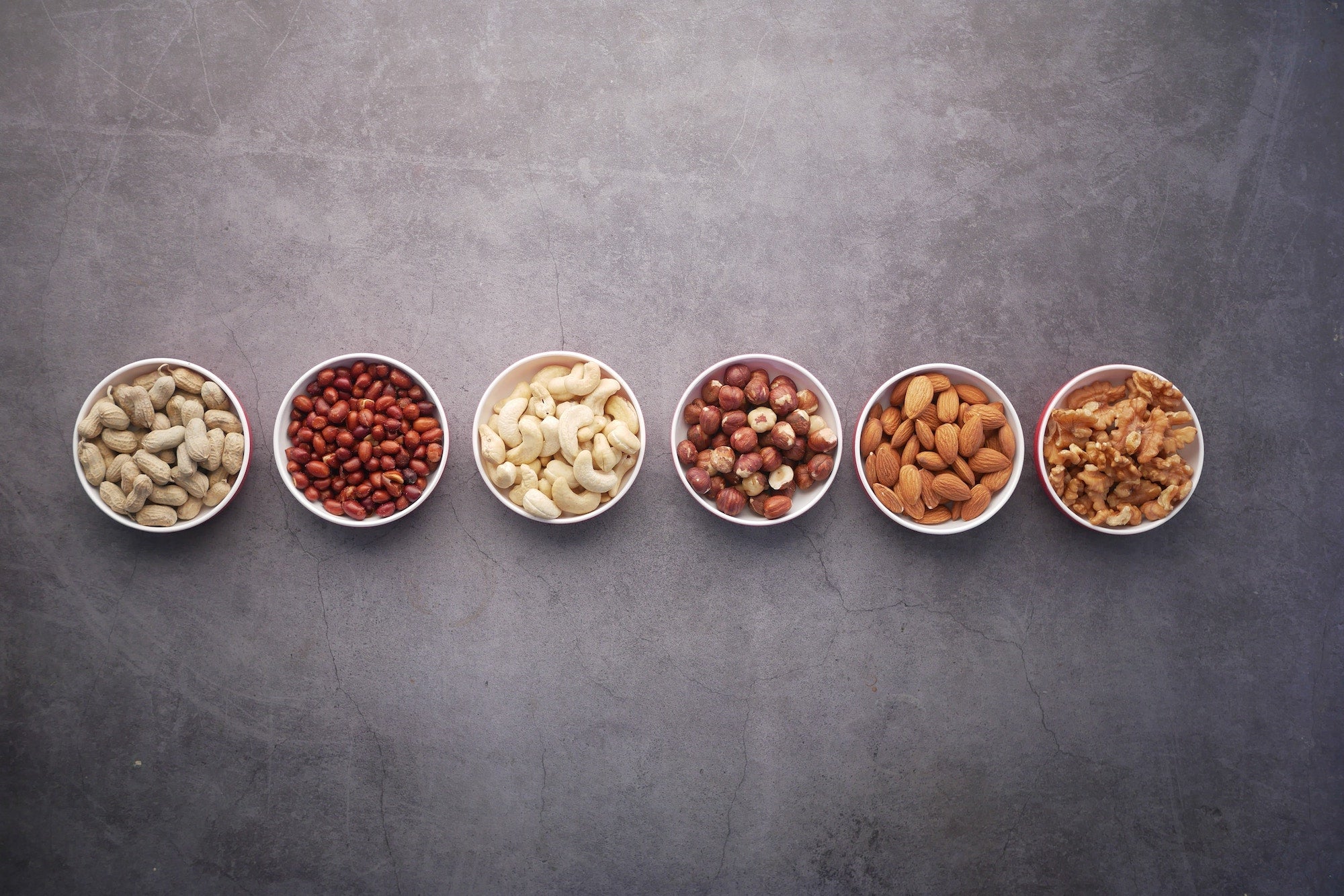Where do you stand on the low-carb vs. keto spectrum?
Think keto and low-carb are the same?
Though both diets limit carbohydrates and offer incredible health benefits, fundamental differences exist in how they work and what it takes to stick to them.
So let’s compare the nuances and research behind low-carb and ketogenic diets to learn which is best for your goals and overall health.
Low-Carb vs. Keto Diets: The Basics
Though keto diets are very low-carb diets, not all low-carb diets are keto.
Here’s what that means:
Low-Carb Diets Limit Carbohydrate Intake To 20-25% of Total Calories
Low-carb diets describe any eating plan that reduces your daily carb intake while increasing your fat and protein intakes.
The goal is to replace inflammatory processed starches and high-carb foods with anti-inflammatory, nutrient-dense foods. Think: healthy fats like avocado and olive oil, non-starchy vegetables, and high-protein legumes, nuts, and seeds (like what’s in every IQBAR).
Though the Mediterranean diet, DASH diet, and Paleo diet mostly follow this wisdom, they don’t require followers to pay attention to how many grams of carbs they eat daily.
A low-carb diet is just the opposite. You must stay within your:[*]
Keto Diets Restrict Carbohydrate Intake To 5-10% of Total Calories
The ketogenic diet is a very low-carb, high-fat meal plan that restricts carbs so much that your body enters the metabolic state of ketosis.[*]
On a standard diet, your body uses glucose for fuel by breaking down carbs in whole grains, fruit, veggies, etc.
When you drastically limit your carbs and up your fat intake, your body turns to an alternate fuel source: ketone bodies. Your liver makes ketones from fat, and they become a steady, excellent power supply for your body and mind.[*]
A keto diet is defined by:
Unlike a more flexible low-carb diet, this very low-carb, high-fat diet requires a commitment to stay in ketosis. Eat too many carbs, and you’ll either never reach ketosis or kick yourself out of this fat-burning state.
🫐 Learn what you can eat on a keto diet (and which food groups to avoid).
The Benefits of Low-Carb vs. Keto for Weight Loss
Many people ask, Can I lose weight eating low-carb but not keto?
Multiple studies show that low-carb diets are more effective than high-carb diets, low-fat diets, and low-calorie diets when it comes to:[*][*][*][*]
- Weight loss
- Weight management
- Appetite reduction
- Obesity prevention and reversal
Low-carb diets are ideal for weight loss because meeting your protein goal increases satiety. Rather than looking for the next carb fix, you can go longer between meals to naturally limit your calorie intake.
Plus, low-carb diets significantly decrease ghrelin, the “hunger hormone” that sends signals from your stomach to your brain.[*]
Researchers even say your metabolism on a low-carbohydrate diet may burn up to 300 more calories at rest.[*] Yet:
Ketosis Puts You In a Fat-Burning State
If rapid weight loss is your goal, keto blows a low-carb diet out of the water. Your body will literally be running on fat in ketosis. Whenever your body needs energy, it will tap into your stored fatty acids for fuel.
That’s why researchers discovered that keto diets may:
- Significantly decrease weight, body fat, and body mass index (BMI).[*][*][*]
- Increase fat loss during exercise, preserve lean muscle, and decrease post-exercise muscle damage.[*][*][*]
- Easily reduce cravings and suppress your appetite.[*][*][*]
Bonus? Many people don’t have to count calories or exercise to lose weight on keto.[*]
Low-Carb Diets vs. Keto for Type 2 Diabetes
What are the benefits of low-carb without ketosis if you have or are at risk of developing type 2 diabetes?
Eating fewer yet high-quality carbs (i.e., legumes, low-carb veggies, leafy greens, etc.) has been shown to help:[*][*][*][*]
- Normalize blood sugar and insulin levels
- Improve insulin resistance
- Reduce hemoglobin A1c
- Increase insulin sensitivity
Despite those fantastic results, trials consistently demonstrate that diets with the highest carb restriction (like keto or the Atkins diet) achieve even better outcomes.
These sugar-restrictive diets help people reduce or eliminate prescribed insulin/oral medication and offer the best route for remission.[*][*][*]
Low-Carb vs. Keto for Heart Health
Replacing inflammatory refined carbs with anti-inflammatory and antioxidant-rich foods offers serious perks for your ticker. Studies reveal that both low-carb and keto diets support:
- Lower blood pressure.[*][*]
- A reduction in high blood pressure medications.[*][*]
- Improved HDL and LDL cholesterol profiles.[*][*]
- Lower triglycerides.[*][*]
- Reduced risk of cardiovascular disease.[*][*]
Experts in one study even noticed that nutritional ketosis improved most heart disease risk biomarkers in just one year.[*]
Low-Carb Diets vs. Ketosis for Your Mental Performance
What’s the difference between keto and low-carb diets for your brain? A lot, actually.
When your brain’s accustomed to high-carb, it gets super cranky when you limit that fuel source. The side effects of carb or sugar withdrawal are known as the dreaded “keto flu.” It includes:[*]
- Irritability, anger, and mood swings
- Brain fog, difficulty concentrating, and headaches
- Sluggishness, fatigue, and depression
- Insomnia and difficulty sleeping
- Cravings and binging
Teetering between varying daily carb intakes may keep you in this miserable state on a low-carb diet. This forces many people to fall off the wagon.
But consistently limiting your carbs on keto will help you overcome the keto flu and stop sugar cravings for good. Then you’ll feel the enlightening effects of:
Your Brain On Ketones (Hint: It Loves Them)
The keto diet was first developed in the 1920s to treat epilepsy and reduce seizures.[*] This early research paved the way for scientists to discover how a keto diet boosts brain health.
According to them, the neuroprotective properties of ketones may prevent or treat Alzheimer’s, Parkinson’s, and other neurodegenerative medical conditions.[*][*] They may even protect our brains from oxidative damage responsible for cognitive decline as we age.[*][*]
Since ketones can cross the blood-brain barrier, your brain wastes no time putting them to work.[*] When you’re in ketosis, you’ll score:[*][*]
- More positive moods
- Greater mental performance and productivity
- Higher focus and concentration
🧠 Are these nutrition essentials for a healthy noggin part of your diet?
Low-Carb vs. Keto: What’s the Best Diet for You?
So which is better, keto or low-carb?
Both diets unlock perks for your well-being but require varying levels of discipline to stick to. So consider starting with a low-carb diet and then transitioning to keto once you get the hang of tracking net carbs and eating within your daily macros. It’s a win-win either way!
Psst! IQBARs make every low-carb journey better. Each flavor packs clean, keto, vegan protein to drive brain + body performance and give your sugar cravings the cold shoulder. Find your next favorite now!
Written by Lauren Ciccarelli, a writer and research geek passionate about low-carb nutrition, mental health, and meditation. Her 2,500+ articles empower doers with science-backed tips for leveled-up living.


